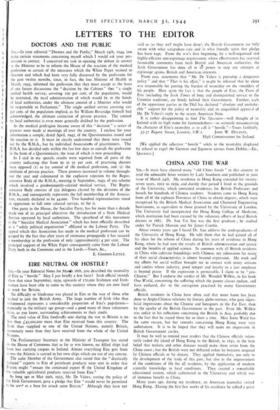EIRE NEUTRAL OR HOSTILE?
SIR,—In your Editorial Notes for Marsh ath, you described the neutrality of Eire as "hostile." May I put briefly a few facts? Irish official records show that since September, 1939, upwards of 57o,000 Irishmen and Irish- women have been able to come to this country where they are now hard Ii work for Britain: No difficulty or hindrance was placed in Eire in the way of those who wished to join the British Army. The large number of Irish who thus voltutteered represents a considerable proportion of Fire's population—
especially in the military age group—and a good many of these volunteers have, as you know, outstanding achievements to their credit.
The total, value of Eire foodstuffs sent during the war to Britain is no less than £45,000,000 more than Eire received from this country. The
Irish thus supplied to .one of the United Nations, namely Britain, immensely more than they have received from the whole of the United Nations, The. Parliamentary Secretary to the Minister of Transport has stated in the House of Commons that as far as was known, no Allied ships had been lost carrying cargoes to Ireland. Almost everything Eire gets from across the Atlantic is carried in her own ships which are out of any convoy. The same Member of the Government also stated that the "drastically reduced" exports to Eire of petroleum products were sent in order that
Britain might "ensure the continued export tir the United Kingdom of the valuable agricultural products received from Eire."
As long ago as May 29th, 1935, Mr. De Valera, stating the policy of the Irish Government, gave a pledge that Eire "would never be permitted to be used as a base for attack upon Britain." Although they have not said so (as they we': might have done\ the British Government are fully aware with what scrupulous care and in what friendly spirit that pledge has been kept. From the war's first beginning, by a well-organised and highly-efficient anti-espionage organisation, whose effectiveness has received favourable comments from both British and American authorities, the Irish Government has done all in itt power to stop any attempts at espionage against British and American interests.
From you statements that "Mr. De Valera is pursuing a dangerous policy" and that "That is his affair," it might be inferred that he alone was responsible for putting the burden of neutrality on the shoulders of his people. Here again the fact is that the people of Eire, the Press of Eire (including the Irish Times of long and distinguished service to the Unionist tradition), are firmly behind their Government. Further, each of the opposition parties in the Dail has declared "absolute and unshake- able" support for the policy of neutrality and an unqualified approval of Mr. De Valera's reply to the recent American Note.
It is rather disappointing to find The Spectator—well thought of in Ireland with its high name for fairmindedness—so seriously misconceiving the character of Eire's neutrality as to call it " hostile."—Yours faithfully, 33-37 Regent Street, London, S.W.i. JOHN W. DULANTY, High Commissioner for Ireland.
[We applied the adjective "hostile" solely to the neutrality displayed by refusal to expel the German and Japanese envoys from Dublin.—ED., Spectator.]






















 Previous page
Previous page